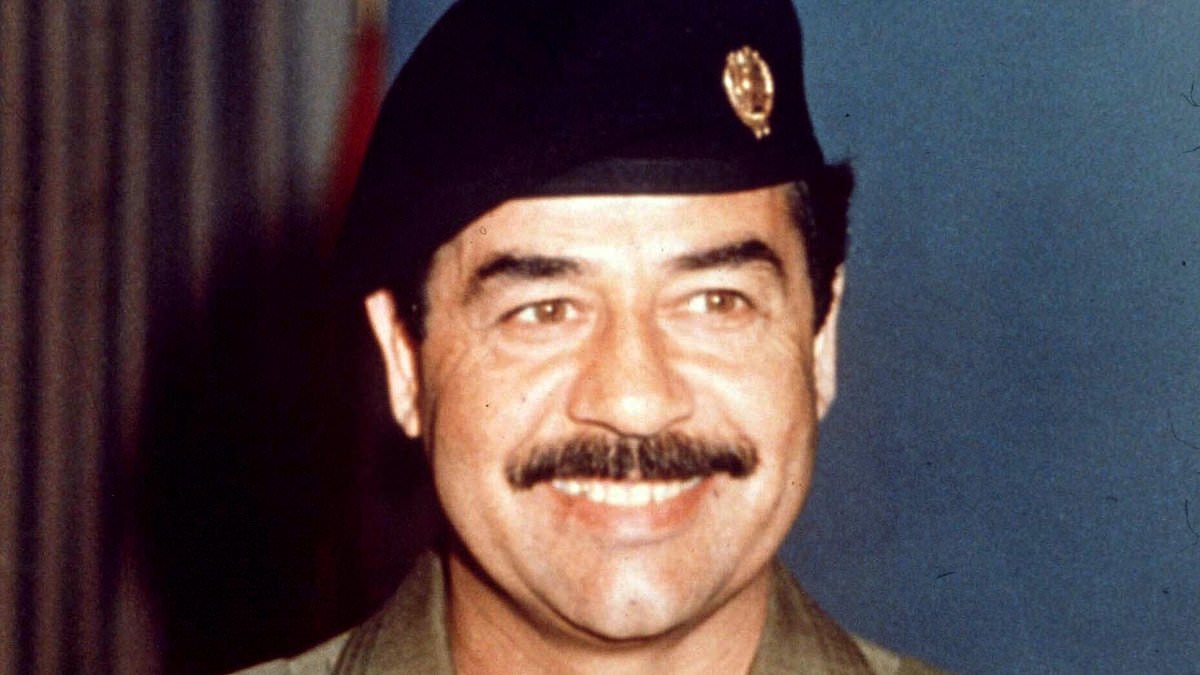President George W Bush was desperate to topple Saddam Hussein amid fears he might orchestrate a repeat of the 9/11 terror attacks, newly declassified records reveal.
Private remarks from the US President in the months leading up to the 2003 invasion of Iraq underlined his commitment to ‘ridding (the world) of evil-doers’, according to the UK’s ambassador in Washington.
Sir Christopher Meyer said Americans broadly trusted President Bush’s decision making on foreign policy, even if, in late 2002, the public were ‘not keen to go to war with Saddam’.
Documents released to the National Archives in Kew hint at Tony Blair’s initial reluctance to invade Iraq on the basis of Iraqi tyrant Hussein’s claim that it had destroyed its WMDs (weapons of mass destruction).
And the Ministry of Defence (MOD) also warned there would be ‘significant levels of internecine violence’ in the aftermath of any invasion.
The UK joined the US-led invasion of Iraq in 2003, leading to Hussein being ousted, with images memorable of jubilant Iraqis toppling a statue of their overthrown former president in Baghdad.
But an inquiry led by Sir John Chilcott later found Mr Blair’s case for invasion was not justified, and that Hussein posed no imminent threat.
Mr Blair stood by the decision to go to war – which many perceive to have tainted his modernist legacy – but apologised for mistakes made.

US president George W Bush was desperate to topple Iraqi leader Saddam Hussein amid fears he might orchestrate a repeat of the 9/11 terror attacks, newly declassified records reveal

The UK’s ambassador in Washington, Sir Christopher Meyer, wrote that ‘much of the impulse for deposing Saddam Hussein comes from Bush himself. More than anything else he fears another catastrophic terrorist attack on the homeland, especially one with an Iraqi connection’. Pictured: Saddam Hussein in 1987

The UK under then prime minister Tony Blair (left) joined the US-led invasion of Iraq in 2003, leading to Hussein being ousted, but an inquiry led by Sir John Chilcott later found Mr Blair’s case for invasion was not justified, and that Hussein posed no imminent threat

President George W Bush took to the aircraft carrier USS Abraham Lincoln on May 2, 2003 to claim major combat operations in Iraq to be over, hailing it ‘mission accomplished’ – a phrase he later came to regret

Hijacked United Airlines Flight 175 from Boston crashes into the south tower of the World Trade Center and explodes at 9.03am on September 11, 2001 in New York City
The newly released documents show Sir Christopher, the UK’s man in Washington, told Downing Street in December 2002 about President Bush’s intentions – and his binary philosophy of good and evil.
He wrote in an end-of-year dispatch: ‘If Bush decides to invade Iraq in 2003, as looks increasingly likely, it will make or break his presidency.
Read More
Blair warned to keep 'out of control' immigration focus group report secret, new documents reveal

‘Much of the impulse for deposing Saddam Hussein comes from Bush himself. More than anything else he fears another catastrophic terrorist attack on the homeland, especially one with an Iraqi connection.
‘His view of the world is Manichean. He sees his mission as ridding it of evil-doers.’
The files also reveal how Mr Blair had travelled to Camp David in January 2003 to urge President Bush to allow more time for diplomacy work.
But Sir Christopher warned it had become ‘politically impossible’ to draw back from war at this stage unless Hussein surrendered.
